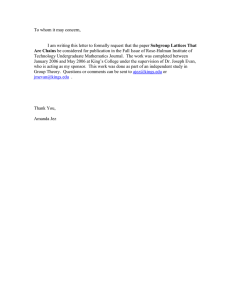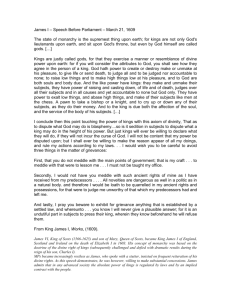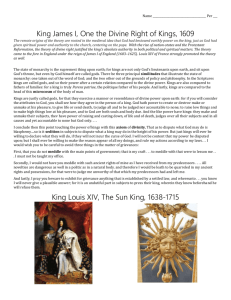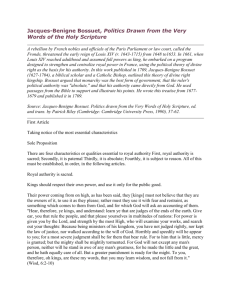in the shadow of leviathan: kingship in the book of job
advertisement
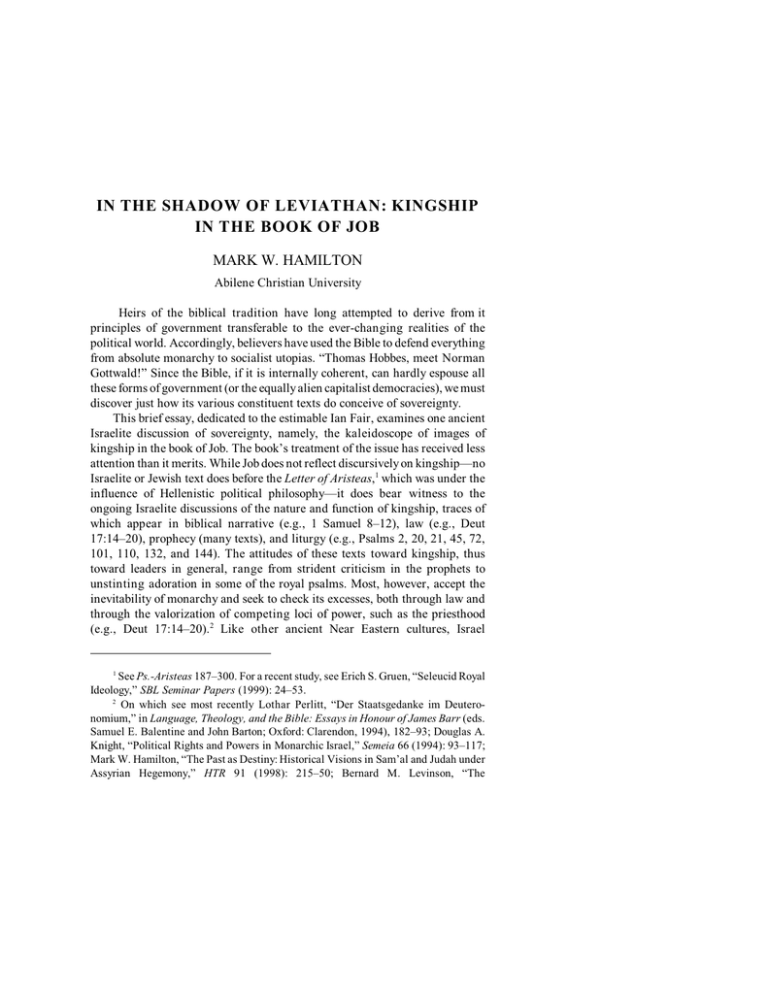
IN THE SHADOW OF LEVIATHAN: KINGSHIP
IN THE BOOK OF JOB
MARK W. HAMILTON
Abilene Christian University
Heirs of the biblical tradition have long attempted to derive from it
principles of government transferable to the ever-changing realities of the
political world. Accordingly, believers have used the Bible to defend everything
from absolute monarchy to socialist utopias. “Thomas Hobbes, meet Norman
Gottwald!” Since the Bible, if it is internally coherent, can hardly espouse all
these forms of government (or the equally alien capitalist democracies), we must
discover just how its various constituent texts do conceive of sovereignty.
This brief essay, dedicated to the estimable Ian Fair, examines one ancient
Israelite discussion of sovereignty, namely, the kaleidoscope of images of
kingship in the book of Job. The book’s treatment of the issue has received less
attention than it merits. While Job does not reflect discursively on kingship—no
Israelite or Jewish text does before the Letter of Aristeas,1 which was under the
influence of Hellenistic political philosophy—it does bear witness to the
ongoing Israelite discussions of the nature and function of kingship, traces of
which appear in biblical narrative (e.g., 1 Samuel 8–12), law (e.g., Deut
17:14–20), prophecy (many texts), and liturgy (e.g., Psalms 2, 20, 21, 45, 72,
101, 110, 132, and 144). The attitudes of these texts toward kingship, thus
toward leaders in general, range from strident criticism in the prophets to
unstinting adoration in some of the royal psalms. Most, however, accept the
inevitability of monarchy and seek to check its excesses, both through law and
through the valorization of competing loci of power, such as the priesthood
(e.g., Deut 17:14–20).2 Like other ancient Near Eastern cultures, Israel
1
See Ps.-Aristeas 187–300. For a recent study, see Erich S. Gruen, “Seleucid Royal
Ideology,” SBL Seminar Papers (1999): 24–53.
2
On which see most recently Lothar Perlitt, “Der Staatsgedanke im Deuteronomium,” in Language, Theology, and the Bible: Essays in Honour of James Barr (eds.
Samuel E. Balentine and John Barton; Oxford: Clarendon, 1994), 182–93; Douglas A.
Knight, “Political Rights and Powers in Monarchic Israel,” Semeia 66 (1994): 93–117;
Mark W. Hamilton, “The Past as Destiny: Historical Visions in Sam’al and Judah under
Assyrian Hegemony,” HTR 91 (1998): 215–50; Bernard M. Levinson, “The
34
RESTORATION QUARTERLY
experienced all types of royal behaviors, and its literature responds with
comparable variety.
On this as on so many issues, Job fits no neat ideological category, though
the book does dialogue with several voices within the Israelite tradition and
indeed sits within the wisdom-oriented part of it. For the book’s author,
kingship exposes the unsettledness of the human condition and thus signals the
nature of divine sovereignty in a world in which humans play a small role.
While for the creators of such texts as 2 Samuel 7 (and Psalm 89 mutatis
mutandis) the stability of a monarchy (David’s) conclusively proves God’s care
for the world, for the author of Job, the transience of kings and their creations
proves the uncanny nature of providence. In the end, the book’s mercurial views
of kingship serve a larger theological agenda. A number of scholars have
pointed out that Job 29, in particular, uses royal imagery extensively,3 although
no one, as far as I can tell, has attempted to explain how the book as a whole
understands kingship or how that understanding might serve the book’s
theological program. This study attempts to fill that gap.
Kingship in Israelite and Ancient Near Eastern Wisdom
To appreciate the achievement of the author of Job, one must first consider
ancient Near Eastern collections of proverbs and admonitions, which frequently
mention monarchs. Whether this reflects the Sitz im Leben of such wisdom or
merely the ubiquity of governmental supervision and taxation remains
unknown,4 although both the book of Proverbs and the roughly
Reconceptualization of Kingship in Deuteronomy and the Deuteronomistic History’s
Transformation of Torah,” VT 51 (2001): 511–34; and Gary N. Knoppers, “Rethinking
the Relationship between Deuteronomy and the Deuteronomistic History: The Case of
Kings,” CBQ 63 (2001): 393–415.
3
See Andre Caquot, “Traits royaux dans le Personnage de Job,” in Hommage à
Wilhelm Vischer (Montpellier: Castelnau, 1960), esp. 34–41; Bruce V. Malchow, “A
Royal Prototype in Job 29,” in The Psalms and Other Studies (ed. Jack C. Knight and
Lawrence A. Sinclair; Nashotah, Wis.: Nashotah House Seminary, 1990), 178–84; for
a significant critique of this reading of Job 29, see Stuart Lasine, Knowing Kings:
Knowledge, Power, and Narcissism in the Hebrew Bible (Atlanta: Society of Biblical
Literature, 2001), 178 n. 1.
4
On the various possible Sitze im Leben of Wisdom, see, e.g., Claudia Camp,
Wisdom and the Feminine in the Book of Proverbs (Sheffield: Almond, 1985); R. N.
Whybray, “The Social World of the Wisdom Writers,” in The World of Ancient Israel
(ed. R. E. Clements; Cambridge: Cambridge University Press, 1989), 227–50; idem,
“The Sage in the Israelite Royal Court,” in The Sage in Israel and the Ancient Near East
(eds. John Gammie and Leo Perdue; Winona Lake, Ind.: Eisenbrauns, 1990), 133–39;
Carole R. Fontaine, “The Sage in Family and Tribe,” in The Sage in Israel and the
Ancient Near East (eds. John Gammie and Leo Perdue; Winona Lake, Ind.: Eisenbrauns,
1990), 155–64.
HAMILTON/IN THE SHADOW OF LEVIATHAN
35
contemporaneous Aramaic text Ahiqar, which some Jews/Israelites (at least on
Elephantine) read around the time of the writing of Job, may have served as
guidebooks for prospective courtiers.5 These books offer practical advice to such
persons (e.g., Prov 25:6–7; Ahiqar 100–103), or delicious send-ups of courtly
pretensions (e.g., Prov 25:2), or critiques of royal abuse of power (Prov
16:12–14; cf. Psalm 101).
The range of sayings mirrors the complexities of power and the paradoxes
it creates in the lives of those who enjoy it—or suffer under it. Lord Acton’s
dictum, “Power corrupts, and absolute power corrupts absolutely,” would not
surprise the ancient sages. Like their counterparts among the prophets, the
creators of proverbs knew well the risks and opportunities that kings (and
leaders in general) pose to a society. They sought to equip their audience with
the ability to understand and respond to royal actions and thereby to insure their
own survival.
Kingship in MT Job
It is thus no surprise that the book of Job, steeped in Wisdom as it is,
betrays a nuanced attitude toward kingship. However, the author achieves an
unprecedented level of theoretical generalization when he abandons the task of
giving advice to courtiers and tries to consider kingship in general. Moreover,
the book’s shifting portrayal of monarchs is not random (as it apparently is in
Proverbs).6 Rather, a subtle theological play of ideas takes place in which the
author first decenters the readers’ confidence in kings and then reorients us to
a new, more uneasy perspective.
In the MT of Job, the noun El#m# (“king”) appears eight times and the verb
El^m* (“to reign, be[come] king”) once. Kings appear in the roles of builders
5
On the courtly setting of Ahiqar’s proverb collection as well as its narrative, see
James M. Lindenberger, The Aramaic Proverbs of Ahiqar (Baltimore: Johns Hopkins
University Press, 1983), 21; idem, “Ahiqar,” OTP 2:479–507; Jonas Greenfield, “The
Wisdom of Ahiqar,” in Wisdom in Ancient Israel: Essays in Honour of J. A. Emerton
(ed. John Day, Robert P. Carroll, and H. G. M. Williamson; Cambridge: Cambridge
University Press, 1995), 43–52; John Strugnell, “Problems in the Development of the
Ahîqar Tale,” Eretz-Israel 26 (1999): 204*–211*. On Proverbs and courtiers, see W. Lee
Humphreys, “The Motif of the Wise Courtier in the Book of Proverbs,” in Israelite
Wisdom: Theological and Literary Essays in Honor of Samuel Terrien (eds. John G.
Gammie et al.; Missoula, Mon.: Scholars Press, 1978), 177–90.
6
On order in Proverbs, however, see R. Skoralick, Einzelspruch und Sammlung:
Komposition im Buch der Sprichwörter Kapitel 10–15 (BZAW 232; Berlin: de Gruyter,
1995), 91–159. Cf. Michael Weigl, “Compositional Strategies in the Aramaic Sayings
of Ahikar: Columns 6–8,” in The World of the Aramaeans III: Studies in Language and
Literature in Honour of Paul-Eugène Dion (ed. by P. M. Michèle Daviau, John W.
Wevers, and Michael Weigl; JSOTSS 326; Sheffield: Sheffield Academic Press, 2001),
22–82.
36
RESTORATION QUARTERLY
(3:14)7 and warriors (15:24; 29:25), and as subjects of divine judgment (34:18)
and protection (36:7), all themes common to ancient Near Eastern treatments
of monarchs.8 In cultures in Israel’s environment, kings acted in culturally
prescribed ways that could be sanctioned by religious language. For example,
a king built a temple in honor of a deity, who was thought to have commanded
the construction. Or, conversely, a king who had gone to war with the blessing
of a deity, obtained via divination, might lose the war, allegedly through the
intervention of another, more powerful god. Cultures passed judgment on kings,
theirs or others’, on the basis of a complex network of ideas and values,
individual aspects of which a writer could deploy as needed. That is, the word
“king” triggered for ancient persons a range of associations that a skilled author
could manipulate in various ways. Thus “king as warrior” could imply “victor,”
“triumph,” “booty,” “national prosperity,” and so on. It could also evoke images
of “risk,” “defeat,” “subjugation,” and the whole range of negative experiences
arising from warfare.
An author as incomparably gifted as the poet of the book of Job could
manipulate these associations to great effect. Thus while the monarchs appear
in the book in roles common to ancient Near Eastern depictions of them, the
treatment of these roles in its theological reflection gives evidence of poetic and
theological virtuosity. The pattern of usage follows the book’s general pattern,
in which Job adumbrates one viewpoint, his friends the opposite, and Yahweh
(apparently virtually equivalent to the voice of the narrator) a third. Let us
examine each perspective in turn.
Job and the Endangered King
The speeches of the character Job depict kings in states of danger or failure,
a portrayal that befits those speeches’ (but not those of the friends!) consistent
use of the language of siege and warfare to describe the threat to Job, the
7
On Palestinian kings as builders, see Jan-Waalke Meyer, “Tempel- und Palastbauten im eisenzeitlichen Palästina und ihre bronzezeitlichen Vorbilder,” in Religionsgeschichtliche Beziehungen zwischen Kleinasien, Nordsyrien und dem Alten Testament
(ed. Bernd Janowski, Klaus Koch, and Gernot Wilhelm; OBO 129; Göttingen:
Vandenhoeck & Ruprecht, 1993), 319–28; for Assyria, see Sylvie Lackenbacher, Le Roi
Bâtisseur: Les récits de construction assyriens des origines à Teglatphalasar III (Paris:
ERC, 1982).
8
On Mesopotamian kingship, see M.-J. Seux, “Königtum,” Reallexikon der Assyriologie 6 (1980–83): 141–72; for Egypt, see Rolf Gundlach, “Zu Inhalt und Bedeutung
der ägyptischen Königsideologie,” in Selbstverständnis und Realität: Akten des
Symposiums zur ägyptischen Königsideologie in Mainz 15.–17.6.1995 (ed. Rolf
Gundlach and Christine Raedler; Wiesbaden: Harrassowitz, 1997), 1–8.
HAMILTON/IN THE SHADOW OF LEVIATHAN
37
innocent sufferer.9 That is, the Job speeches paradoxically present state power
as a threat, and kings, not as the instruments of power, but as its victims.
The lament in Job 3:11–26, to begin, lists a series of persons disconnected
from society, including stillborn infants and prisoners. Surprisingly, the first
part of the list associates Job “with kings and counselors of the earth, the
builders of ruins (tw{rj
* )( 10 for themselves.” While ancient Near Eastern
monarchs, like most other rulers, took pride in their construction activities (cf.
Jer 22:14–16; the architecture of capitals such as Samaria and Jerusalem; the
palace at Ramat Rahel),11 Job recognizes the futility of their work. If, as is
likely, the book of Job comes from the period of the Persian Empire (539–332
B.C.E.), the book may have in mind this period’s rebuilding of cities destroyed
by the Babylonians in Palestine.12 A major feature of royal self-display in
antiquity, represented by hundreds of inscriptions in all the major languages of
the Near East, thus stands exposed as an exercise in futility. Not palaces do they
build, but “ruins.” These kings, far from projecting their desired image as
guarantors of social and economic order, thus as recipients of divine favor, fall
victim to the disorder that threatens all other human beings.
Paradoxically, however, Job contrasts his situation unfavorably to that of
the disappointed kings, who at least no longer experience the hostility of an
angry deity. While he does not necessarily see death (of kings or anyone else)
as a positive good, a relief,13 the futility of the monarchs’ building projects
seems enviable in contrast to his own loss. Indeed, as Bruce Zuckerman puts it,
chapter 3 is “Job’s opening battle cry [is] . . . his means of serving notice on
9
On the themes of warfare and siege in the speeches of Job (and the Psalms), see
Peter Riede, Im Netz des Jägers: Studien der Feindmetaphorik der Individualpsalms
(WMANT 85; Neukirchen-Vluyn: Neukirchener, 2000), esp. 59–63, 66–74.
10
For a defense of this reading, see David J. A. Clines, Job 1–20 (WBC 17; Dallas:
Word, 1989), 72. Clines points out that Mesopotamian kings took pride in reconstructing
ancient ruins. This would argue for understanding Job 3:14 as a double entendre: “kings
seek to rebuild ruins, but they only fall into ruin again.”
11
Israelite and Judahite kings during the Iron Age built monumental structures, by
means of which they apparently sought to project their power and glory. For a recent
summary of royal building activities in the Israelite kingdoms, see Rüdiger Schmitt,
Bildhafte Herrschaftsrepräsentation im eisenzeitlichen Israel (AOAT 283; Münster:
Ugarit, 2001), 139–57.
12
For a survey of the evidence of rebuilding, see Ephraim Stern, Archaeology of the
Land of the Bible, vol. 2: The Assyrian, Babylonian, and Persian Periods 732–332 BCE
(New York: Doubleday, 2001), esp. 461–69.
13
I cannot agree with the reading of William P. Brown, for whom Job envisions
death as a “different form of existence, one without trouble and fear, as inclusive as it
is liberating.” This viewpoint seems anachronistic. (William P. Brown, The Ethos of the
Cosmos: The Genesis of Moral Imagination in the Bible [Grand Rapids: Eerdmans,
1999], 323).
38
RESTORATION QUARTERLY
God that this Righteous Sufferer has had enough.”14 The mention of the kings
fits into this cry because the author portrays Job as a near king (29:25) who has
built for naught.
This theme of failure continues in the second Joban mention of kings
in12:18:
The discipline (rs*Wm) of kings he loosens (j^TP
@ )! ,
the loincloth (roza@) from their waists.
Chapter 12 as a whole mocks the friends’ theology, with verses 16–21 in
particular focusing upon divine deportation of conquered magnates, thus on the
ultimate divine rule over human history. Drawing on the experience of foreign
conquest, particularly by the Assyrians and Babylonians, and perhaps the
prophetic predictions of the demise of kings (e.g., Isa 14:3–23; Jer 22:10–30),
the text again emphasizes the vulnerability of kings and their subordinates.
The translation of this verse is problematic. Commentators, uncomfortable
with the MT’s rs*Wm (“discipline, instruction”) often repoint it as rs@om (“fetter,
band”).15 How can God strip moral formation or discipline off a king as one
would a garment? Indeed, the noun “fetter, band” is used with the Piel of jtp
in Ps 116:16 and Job 39:5. However, this translation would be surprising in Job
12:18 because the surrounding verses all speak of divine punishment of
notables, not just of reversal of fortune, as the standard English translations and
most commentators assume. These translations seem pedestrian in comparison
to MT. “Loosing fetters” makes poorer poetry than “loosing discipline.”
Moreover, the idea of being “clothed” with virtues or vices appears frequently
in the Hebrew Bible. For example, one may wear (vbl) “shame” (tv
G B); Job
8:22), “righteousness, loyalty” (qd#x;# Job 29:14), and “glory” (rd*h;* Job 40:10),16
to take only a few examples. It would thus not be too surprising to find a king
wearing “discipline” or having it stripped off him as the deity removes him from
power.
The third appearance of kings in the Joban speeches occurs in 29:25.17
Concluding a summary of his past behavior as protector of the weak, a kingly
role according to Psalm 101, Job speaks of himself presiding as king over a
14
Bruce Zuckerman, Job the Silent: A Study in Historical Counterpoint (Oxford:
Oxford University Press, 1991), 126.
15
See Clines, Job 1–20, 280; H. H. Rowley, The Book of Job (NCBC; Grand
Rapids: Eerdmans, 1976), 95–96.
16
On the Hebrew Bible’s metaphorical use of clothing imagery, see Thomas
Podella, Das Lichtkleid JHWHs: Untersuchungen zur Gestalthaftigkeit Gottes im Alten
Testament und seiner altorientalischen Umwelt (FAT 15; Tübingen: Mohr/ Siebeck,
1996), esp. 72–82.
17
However, some ancient versions do not read “king” here. 11Q10 (11QtargumJob)
apparently reads var (“head”) (col. xv, ln. 3; = DJD 23, p. 116).
HAMILTON/IN THE SHADOW OF LEVIATHAN
39
“band” (dWdG=), a word that elsewhere in the book denotes God’s menacing army
(19:12; 25:3). Like the king who harries the wicked out of the land in Ps 101:8,
Job threatens evildoers.
Yet, as chapter 30 makes clear, this situation has been reversed. Dangerous
Job (as the wicked formerly knew him) is now endangered, having lost all status
and thus the support of his retainers. Although he has fulfilled the obligations
that monarchs owe their vulnerable subjects, he has received no commensurate
blessings. Indeed, the wicked have returned to power and now mock him. His
times are out of joint, his confidence in the basic justice of the cosmos shaken.
To summarize, then, the speeches of the character Job play on basic features
of ancient Near Eastern kingship—the king as builder, sage, and protector of
the poor—to highlight his decline and, therefore, the basic absurdity of the
cosmos and all human activities within it. While only 29:25 calls Job a king, the
other pericopes under consideration hint at his regal status. But if he is a sort of
king, he is only one that has received divine punishment, however unjustly.
The Friends and the Dangerous King
In contrast to this view both of the character Job and of kings—thus of the
cosmos itself as a place of chaos—the speeches of the friends construct a world
in which justice reigns and those reigning are just. Often the speeches of the
other characters in the book of Job play with the same motifs as those of the
book’s hero, now trying one viewpoint, now another. Thus they offer alternative
views of kingship as well.
In Job 15:24, Eliphaz describes the fate of the wicked who has “stretched
out his hand against El, tried to be a hero against Shaddai” (v. 25). “Distress
and calamity” (hq*Wxm=W rx^) beset him as if they were a king “ready for battle.”
In an offhanded way, though not a “strange” one as Clines claims,18 Job’s friend
thus evokes the function of the king to punish the wicked. The king appears,
briefly, in a powerful role. Moreover, Eliphaz reminds Job that kings can reduce
cities to ruin (v. 28), echoing the earlier depiction of the king as builder (as in
3:14), but with a new twist. The king who protects order demolishes the
settlements of the wicked, thus eliminating their threat to the sovereignty of
justice and order in the cosmos.
Bildad extends this view of royal prosecution of the wicked in 18:14: “He
[the wicked] is dragged from his tent, his shelter; they march him off to the king
of terrors.”19 While the precise referent and background of the possibly mythological “king of terrors” (tw{hL*B~ El#m#), if indeed that is the correct translation,
remain elusive, the idea that a monarch menaces the wicked is clear enough.
18
Clines, Job 1–20, 343.
Or “terrors march him off to the king.” On the translation of 14b, see ibid., 406,
and references there.
19
40
RESTORATION QUARTERLY
Indeed, this is a king’s basic job (see Psalm 101). For Bildad, as for Eliphaz,
monarchs guarantee order and the basic justice of human life.
Elihu and the Endangered King
The last introduced friend of the book, Elihu, offers a more complex view
still. He agrees with the other friends that God’s justice operates in a system of
rewards and punishments and that glitches in the system, if they are not
illusions, demonstrate the inscrutability of the divine will, not flaws in humans’
basic understanding of it. At the same time, he concedes the vulnerability of
kings to God’s judgment, but sees this not as evidence of the absurdity of the
cosmos (as Job does in 3:14 and 12:18) but as testimony to the deity’s basic
fairness. Thus 34:18—“He calls20 a king ‘villain’/he indicts princes”—functions
as part of a defense of El’s sovereignty against Job’s charges of malfeasance in
chapter 12. This sovereignty allows God to unmake bad kings (34:30).
Moreover, he can seat the righteous next to kings (36:7). Monarchy thus
becomes a sign of God’s beneficence, not of divine threat to the wicked.
Behind their verbosity and simplistic theology, the Elihu speeches serve an
important purpose in the final form of Job. They allow the author to nuance the
views of both Job and his so-called friends, underlining the flexibility with
which one may interpret kingship and its place in the larger governance of the
world. They highlight Yahweh’s ultimate sovereignty and seek to vindicate the
deity of charges of injustice. While they do not precisely anticipate Yahweh’s
reflections on kingship, they do hint at the wider vision of chapter 41.
Leviathan as King
The larger vista at which Elihu hints opens wide with the final appearance
of a king in the book. Job 41:26 concludes Yahweh’s portrait of Leviathan with,
“He scans everything high/he is king over all the sons of pride (Jj^v* yn@B)+ .” Job
28:8 had earlier introduced this brood of creatures as one famous for its ability
to traverse hard roads but inability to tread the hardest one, the one leading to
wisdom. This gaggle of animals is apparently identical to the menagerie that
Yahweh introduces in chapters 38–41 as proof both of his benevolent care for
the world beyond humankind and of the utter smallness of Job and his fellow
human beings. The animals are both vulnerable and religious—the ravens’
young pray to God for food in Job 38:41—thus like Job himself. As William
Brown puts it,
Yahweh’s presentation of zoological exotica is intended to earn Job’s respect. . . .
He sees himself “small” before these untamable creatures, yet at the same time
20
With the versions, read rm@oah*; MT’s he interrogative makes little sense here.
HAMILTON/IN THE SHADOW OF LEVIATHAN
41
finds confirmation in his own struggle and role within the arena of culture and
community.21
If humankind in its struggle to make sense of suffering and joy shares this
task with the animal kingdom, as Yahweh’s speeches in Job 38–41 imply, then
it is altogether fitting that Leviathan, the sea monster exemplifying the fierce
beauty of the world, “red in tooth and claw,” should haunt the author of Job. Not
only does his hero curse himself by summoning “those who rouse Leviathan”
(Job 3:8), but he contrasts himself with the related sea monster /yN]T~ in Job 7:12
(this beast occupies the same genus as Leviathan in Ps 74:13–14 and Isa 27:1).
Yahweh, he believes, treats him as though he were the cosmogonic monster who
must be defeated at all costs.22 The divine hunter, one who plays the role of a
king, appears here, ironically anticipating Yahweh’s comparison of his abilities
as a hunter (thus defender of cosmic order) with those of Job in chapter 41.
Leviathan, in short, is Job’s opposite number and a proof of his marginality in
the structure of the cosmos. The taming of Leviathan demonstrates Yahweh’s
sovereignty and beneficence since without such domestication no life could
exist.23
At the same time, Leviathan exists as a proof of the triviality of the
achievements of human kings. Ancient Near Eastern kings liked to portray
themselves as hunters, builders, warriors, and priests. Yet no one can hunt
Leviathan or conquer him. No one built the world that he rules (except God).
His worship (assuming that, like the ravens of Job 38:41, he prays) depends on
no human. Leviathan is thus king and antiking, and his story marks, as Leo
Perdue puts it, “the deconstruction of the metaphor of ruler.” 24
Conclusion: Job’s Theology of Sovereignty
What, then, does the author of Job think about the nature and limits of
human sovereignty? This brief survey of the book’s use of the single root ilm
has uncovered an intricate network of perspectives on humans’ paramount
rulers, kings. The character Job emphasizes their vulnerability as proof of
Yahweh’s tyrannical grip on the world. The friends understand kings as
21
Brown, Ethos of the Cosmos, 375.
Indeed, this is part of a leitmotif in the Joban speeches: God the (royal) lion
hunter stalks Job (Job 10:16). This latter text plays off a common ancient Near Eastern
notion of lion hunting as a sign of royal prowess and fitness for rule. Again, the
reflection on sovereignty, human and divine, takes a new turn.
23
For a discussion of the theological ramifications of the treatment of Leviathan, see
Henry Rowold, “!awh yl ?awh ym: Leviathan and Job in Job 41:2–3,” JBL 105 (1986):
104–9; Brown, Ethos of the Cosmos, 371–72.
24
Leo G. Perdue, Wisdom and Creation: The Theology of the Wisdom Literature
(Nashville: Abingdon, 1994), 175–76. Perdue hints at Job’s interest in human
sovereignty but does not work out the details significantly.
22
42
RESTORATION QUARTERLY
harmonizers of the divine and human worlds. The Yahweh speeches, on this as
on every other issue they address, reframe the question set by the human
characters’ discussions. “Let us speak,” God says from the whirlwind, “of the
uncanny king whose very existence makes human sovereignty a mockery.”
In other words, the book’s discussion of human kingship is really about
something else, divine kingship, God’s governance of the world. As so often in
the book, the surface level of the discourse points to another, higher level of
discourse. The conversation on divine kingship—though Yahweh is never called
a El#m!# —first appears in the interview with the Satan in chapters 1–2 and
concludes with the restitution that God makes to Job in chapter 42. The question
with which Job toys is, “Is God a tyrant?” This charge takes various forms and
cites as evidence not only Job’s misery (which chapters 1–2 would have us
believe God caused since the Satan is merely an instrument of divine testing)
but also the nobles’ abuse of the poor and the (causally linked?) success of the
wicked (chap. 24). Yahweh defends himself against these charges—though
without denying them—by pointing to his care for the nonhuman world and
suppression of the forces of Chaos, thus implying either that the present
suffering of humans serves some unspecified cosmic purpose or, more likely, is
simply beyond divine control at the moment.
Either way, Job, like the book of Lamentations or Psalm 89 or Jer 20:7–18,
among many other biblical texts, views divine sovereignty as an unalterable fact
that is nevertheless not unproblematic for human beings. Yahweh’s universe
does not operate according to human moral norms, yet humans are called to be
moral and responsible. Piety does not insure so much as physical safety, much
less status and wealth, yet piety is an operating principle of all the creation
(even the ravens!), hence Job’s sacrifice for his friends at the end of the book.
Perhaps, as Melanie Köhlmoos has argued, the divine speeches allow Job to
embrace Yahweh and the creation simultaneously as things that concern him.25
Still, this remains difficult. True piety demands that we recognize that human
suffering and prosperity are undeserved, yet are the result of divine action,
action that cannot always easily be described as “grace.” 26
All of this speaks to Israelite notions of human leadership as well. Like the
Deuteronomi(sti)c circles with whom it is often contrasted, the book of Job holds
no illusions about the capacities of leaders to work disinterestedly for the
common weal. Yet the book does offer room for a provisional respect for such
leaders and summon them to be pious and, like Job, to care for the poor and
25
Melanie Köhlmoos, Das Auge Gottes: Textstrategie im Hiobbuch (Forschungen
zum Alten Testament 25; Tübingen: Mohr/Siebeck, 1999), esp. 352.
26
On which, see Mayer Gruber, “Human and Divine Wisdom in the Book of Job,”
in Boundaries of the Ancient Near Eastern World: A Tribute to Cyrus Gordon (eds. Meir
Lubetski, Claire Gottlieb, and Sharon Keller; JSOTSS 273; Sheffield: Sheffield
Academic Press, 1998), 101.
HAMILTON/IN THE SHADOW OF LEVIATHAN
43
vulnerable (chapter 31), as all humans must do. The book, then, is one for an
Israel come of age, shorn of its delusions, but living in hope.
Finally, one wonders why the book of Job was worried about kings, even
granted that its ultimate subject is Yahweh. If the book comes, as most scholars
assume, from the Achaemenid period, it is tempting to try to connect it with the
failure of the Israelite/Jewish community to find a solution to political dependence. One thinks of the apparent disappointment of Zerubbabel’s messianic
aspirations (see Hag 2:20–23), or of the silence of the era’s great historiographic
works (the Deuteronomistic History, finished just prior to the Persian Empire,
and the Chronicler’s History, finished perhaps near the end of the Persian
period) on the restoration of monarchy, or of Ezekiel’s demotion of the monarch
to the rank of “prince” (Ezek 44:3). The author of Job holds no brief for kings,
human or divine, believing that his is the era of Leviathan. Thomas Hobbes
would feel at home.
Appendix: $"F48,bH, “King,” in LXX Job
While the MT of Job uses royal behavior as a window into the complexity
of the divine governance of the cosmos, the LXX significantly reconfigures the
presentation of monarchs. The differences between the two texts present a
problem, not for textual criticism, but for literary (higher) criticism. In general,
the LXX of Job is a markedly abbreviated, perhaps bowdlerized version of the
Hebrew.27 Several lines that include El#m# appear in the Greek tradition in the
asterisked materials (Job 29:25; 36:7), and the same is true of Job 34:30’s El^m*
(“to be king”) = $"F48,bT. Job 15:24 reads in Greek FJD"J0(`H (“general”)
instead of $"F48,bH. In other words, the Old Greek unravels the complex
tapestry of signification that the MT presents. Later recensions of the LXX
correct towards (Proto-) MT in ways that are too complex to discuss here.28 In
Greek, the three friends do not counter Job’s view of kingship (except perhaps
in Job 18:14, a verse presenting its own problems).
On the other hand, the Septuagint translation tradition does recast the
book’s principle characters as monarchs. Additions to 2:11 and 42:17 make
27
On the Greek translation of Job, which preserves the Theodotion/6"\(, text, see
esp. E. Dhorme, A Commentary on the Book of Job (London: Nelson, 1967), cxcvi–ccvi;
Peter John Gentry, The Asterisked Materials in the Greek Job (SBL Septuagint and
Cognate Studies Series, 38; Atlanta: Scholars Press, 1995); and Natalio Fernández
Marcos, The Septuagint in Context: Introduction to the Greek Version of the Bible
(Leiden: Brill, 2000), 146 n. 20.
28
For a discussion of the relationship between OG and R, see Gentry, Asterisked
Material, 382–493.
44
RESTORATION QUARTERLY
Eliphas basileus of the Temanites, Baldad tyrannos of the Sauchaeans, and
Sophar basileus of the Minaeans. Even more dramatically, Job LXX adds after
42:17 the following notice:
This is translated (©D:0XLF,J"4 ) out of the Aramaic book: In the land of the
inhabitants of Ausitis in the regions of Idumaea and Arabia, a certain person named
Jobab reigned. Taking an Arab wife, he engendered a son named Ennon, and his
father was Zare, grandson of Esau; and his mother was Bosorras, so he was five
generations removed (B X:BJ@< ) from Abraham.
The text then inserts Gen 36:31–35, the list of Edomite kings including this
Jobab, with the modification, “after Balak [the MT adds Bela, perhaps the
second-millennium Transjordanian ruler Balu>a known from archaeology] was
Jobab, the one called Job.”29
This expansion of the Hebrew text is the result of several interpretive
moves, notably the equating of two biblical characters with similar-sounding
names, especially in Greek. The creator of the LXX Job, perhaps drawing on
earlier tradition (“the Aramaic book”), wrestled with the question, later
widespread, of why a non-Israelite merited a biblical book. The proffered
solution is that Job was a descendant of Abraham, thus a near-Israelite. This
reading would be compelling during the second and first centuries B.C.E., the
time of the Old Greek translation of Job, an era when Idumaeans were
converting to Judaism en masse (as, most famously, with the case of the family
of Antipater, father of Herod the Great),30 though not without opposition (see Sir
50:26). This reading also dates Job, thus staking out a position in a larger intraJewish debate on the correct chronological placement of the book.31 (Indeed, the
LXX tradition sometimes updates the Hebrew text to account for religious or
even political developments, an indication that in the two or three centuries
before Christ, biblical texts remained fluid.)32 More to the point, it locates Job
firmly within the Israelite, monotheistic tradition without serious distortion of
the plain sense of that book or the rest of the emerging biblical canon.
The LXX’s metamorphosis of Job into a monarch results from an
interpretation of certain features of the Hebrew text, perhaps most obviously the
On the Balu)a Stele, see William A. Ward and M. F. Martin, “The Balu)a Stele:
A New Translation with Palaeographic and Historical Notes,” Annual of the Department
of Antiquities of Jordan 8–9 (1964): 5–29.
30
See the opening chapters of Peter Richardson, Herod: King of the Jews and
Friend of the Romans (Minneapolis: Fortress, 1999).
31
A very late crystallization of the debate (though with much earlier texts included)
appears in b.Baba Bathra 15a.
32
For an interesting case, the modification of the oracle against Tyre in Isaiah 23
LXX to include the Roman destruction of Carthage in 146 BCE, see Arie van der Kooij,
The Oracle of Tyre: The Septuagint of Isaiah XXIII as Version and Vision (Leiden: Brill,
1998), esp. 186–87.
29
HAMILTON/IN THE SHADOW OF LEVIATHAN
45
royal language in chapter 29.33 Without exploring the far-reaching implications
of this interpretive move in later ancient and medieval treatments of the book,34
we should consider the possible effects of the move on a community reading the
LXX version of Job. That study, alas, must await another occasion.
33
See n. 3 above.
The most proximate text so influenced is the first-century CE Testament of Job.
See, e.g., Berndt Schaller, “Das Testament Hiobs und die Septuaginta-Übersetzung des
Buches Hiobs,” Bib 61 (1980): 377–406. For a history of the royal interpretation of Job,
see Samuel Terrien, The Iconography of Job through the Centuries: Artists As Biblical
Interpreters (University Park, Pa.: Pennsylvania State University Press, 1996), 45–49.
34
